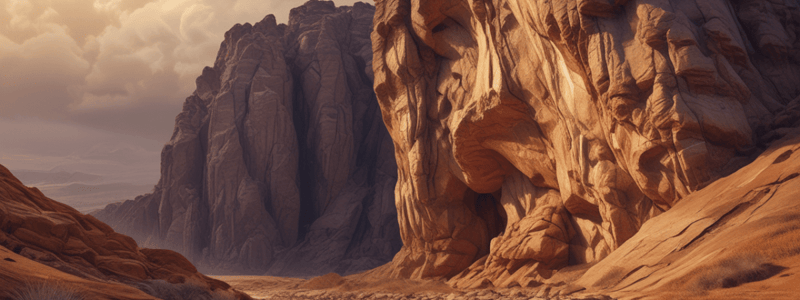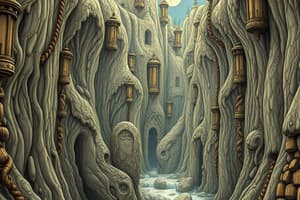Podcast
Questions and Answers
What is weathering?
What is weathering?
- The process of decomposing, breaking up, or changing the color of rocks (correct)
- The adding of sediments, soil, and rocks to a landform or land masses
- The movement of rocks and sediment
- The process of moving smaller pieces of rock by natural forces
What type of weathering causes changes to the minerals inside or on the surface of a rock?
What type of weathering causes changes to the minerals inside or on the surface of a rock?
- Chemical weathering (correct)
- Biological weathering
- Atmospheric weathering
- Mechanical weathering
What is an example of mechanical weathering?
What is an example of mechanical weathering?
- Worms eating away at a rock
- Ice moving and shifting a rock
- Water seeping into a rock and freezing, expanding, and breaking the rock (correct)
- Plants growing on a rock and breaking it apart
What is the process of moving smaller pieces of rock by natural forces?
What is the process of moving smaller pieces of rock by natural forces?
What are the three main causes of erosion?
What are the three main causes of erosion?
How can water cause erosion?
How can water cause erosion?
What is deposition?
What is deposition?
What marks the end of the erosion process?
What marks the end of the erosion process?
What can result from deposition?
What can result from deposition?
Flashcards are hidden until you start studying
Study Notes
Weathering and Erosion
- Weathering is the process of decomposing, breaking up, or changing the color of rocks.
- Erosion is the movement of rocks and sediment that have been broken apart through weathering.
Types of Weathering
- Chemical weathering: causes changes to the minerals inside or on the surface of a rock through chemical reactions.
- Mechanical weathering: caused by frost, ice, moving water, or heat from the sun, examples include water seeping into a rock and freezing, expanding, and breaking the rock.
- Biological weathering: occurs when plants, animals, and other living organisms cause larger rocks to break into smaller pieces, examples include worms and tree roots.
Erosion
- Erosion is the process of moving smaller pieces of rock left over after weathering by natural forces.
- The three main causes of erosion are water, wind, and ice.
- Water can cause erosion through rain, rivers, waves, and floods, and can carry particles along the way.
- Wind can pick up and carry loose particles and dust, causing erosion through abrasion.
- Ice, in the form of glaciers, can move and shift, causing erosion.
- Gravity can also cause erosion, such as through landslides or rock slides.
- Living organisms, including humans, can cause erosion through their actions.
Deposition
- Deposition is the process of sediments, soil, and rocks being added to a landform or land masses.
- It marks the end of the erosion process and can result in the formation of a new landform.
Weathering and Erosion
- Weathering is the breakdown of rocks, leading to changes in their composition, color, or structure.
- Erosion is the transportation of weathered rocks and sediment through natural forces.
Types of Weathering
- Chemical weathering: involves chemical reactions that alter the minerals within or on the surface of rocks.
- Mechanical weathering: occurs due to physical forces, such as frost, ice, moving water, or heat from the sun, causing rocks to break apart.
- Biological weathering: results from the actions of living organisms, such as plants and animals, that cause rocks to fragment.
Erosion
- Erosion is the process of moving weathered rocks and sediment through natural forces, including water, wind, ice, and gravity.
- Water erosion: occurs through rain, rivers, waves, and floods, and can carry particles along the way.
- Wind erosion: involves the pickup and transport of loose particles and dust, causing abrasion.
- Ice erosion: occurs through glaciers, which move and shift, causing erosion.
- Gravity erosion: occurs through landslides or rock slides.
- Human-induced erosion: results from human activities, such as deforestation, mining, or construction.
Deposition
- Deposition is the process of adding sediments, soil, and rocks to a landform or land mass, marking the end of the erosion process.
- Deposition can lead to the formation of new landforms.
Studying That Suits You
Use AI to generate personalized quizzes and flashcards to suit your learning preferences.




